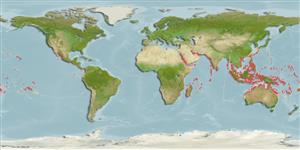Teleostei (teleosts) >
Blenniiformes (Blennies) >
Blenniidae (Combtooth blennies) > Salariinae
Etymology: Parablennius: Greek, para = the side of + Greek, blennios = mucus (Ref. 45335).
More on authors: Jordan & Seale.
Environment: milieu / climate zone / depth range / distribution range
Ecology
Marine; demersal; depth range 1 - 10 m (Ref. 58302). Tropical
Indo-West Pacific: Persian Gulf, central coast of Oman, Pakistan, southwest India, Sri Lanka, Gulf of Thailand, and Philippines (Ref. 11441). Intoduced to Hawaii (Ref. 58302).
Size / Weight / Age
Maturity: Lm ? range ? - ? cm
Max length : 6.2 cm TL male/unsexed; (Ref. 11441); 5.0 cm TL (female)
Facultative air-breathing in the genus (Ref. 126274); Adults are found solitary or in small groups in sheltered turbid coastal reefs (Ref. 90102). Benthic in algae and fouling communities in estuaries (Ref. 58302). Oviparous. Eggs are demersal and adhesive (Ref. 205), and are attached to the substrate via a filamentous, adhesive pad or pedestal (Ref. 94114). Larvae are planktonic, often found in shallow, coastal waters (Ref. 94114).
Life cycle and mating behavior
Maturities | Reproduction | Spawnings | Egg(s) | Fecundities | Larvae
Oviparous, distinct pairing (Ref. 205).
Randall, J.E., 1995. Coastal fishes of Oman. University of Hawaii Press, Honolulu, Hawaii. 439 p. (Ref. 11441)
IUCN Red List Status (Ref. 130435)
Threat to humans
Harmless
Human uses
Tools
Special reports
Download XML
Internet sources
Estimates based on models
Preferred temperature (Ref.
123201): 25.2 - 29.3, mean 28.4 °C (based on 3649 cells).
Phylogenetic diversity index (Ref.
82804): PD
50 = 0.5000 [Uniqueness, from 0.5 = low to 2.0 = high].
Bayesian length-weight: a=0.01072 (0.00457 - 0.02514), b=3.01 (2.83 - 3.19), in cm total length, based on LWR estimates for this Genus-body shape (Ref.
93245).
Trophic level (Ref.
69278): 2.9 ±0.1 se; based on size and trophs of closest relatives
Resilience (Ref.
120179): High, minimum population doubling time less than 15 months (Preliminary K or Fecundity.).
Fishing Vulnerability (Ref.
59153): Low vulnerability (10 of 100).
